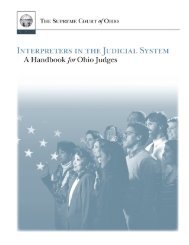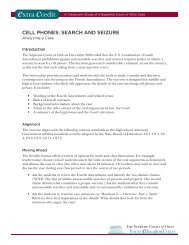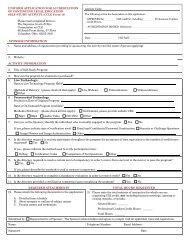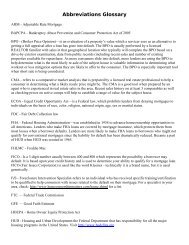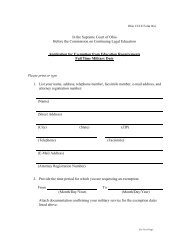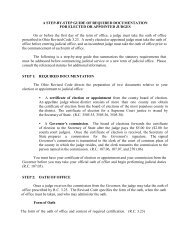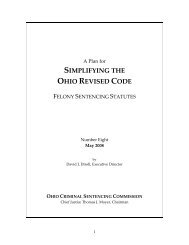Planning for Parenting Time: Ohio's Guide for Parents Living Apart
Planning for Parenting Time: Ohio's Guide for Parents Living Apart
Planning for Parenting Time: Ohio's Guide for Parents Living Apart
You also want an ePaper? Increase the reach of your titles
YUMPU automatically turns print PDFs into web optimized ePapers that Google loves.
Child Development and Suggested <strong>Parenting</strong> Schedules<br />
Schedules 12, 13 and 14<br />
include overnights. These<br />
schedules are <strong>for</strong> parents<br />
who:<br />
• Have cared <strong>for</strong> the child<br />
nearly equally, or<br />
• Both know how to care<br />
<strong>for</strong> the child overnight,<br />
or<br />
• Live close enough to<br />
each other that the child<br />
will not have long car<br />
trips between the homes,<br />
or<br />
• Can communicate and<br />
cooperate with each<br />
other about the child’s<br />
care and well-being, or<br />
• Have successfully<br />
followed Schedule 11 <strong>for</strong><br />
a while.<br />
12<br />
13<br />
Schedule 12: Split each week and weekend. (See a<br />
sample schedule on page 20.)<br />
Comment: This schedule lets the parents take part<br />
nearly equally in the child’s school life. It also<br />
provides a consistent routine, accommodates a child’s<br />
ability to be apart from either parent <strong>for</strong> three or four<br />
days, and allows the child to have a “stay-home” day<br />
(Saturday or Sunday) with each parent each week,<br />
which is helpful to many young children. <strong>Parents</strong> who<br />
want full weekends with or without the child may not<br />
like this schedule, but it can be written to allow full<br />
weekends during the summer or on holidays. Also, the<br />
schedule can be written so that in Week 1, Parent A<br />
has three overnights and Parent B has four, and in Week<br />
2, Parent B has three overnights and Parent A has four.<br />
Schedule 13: Each parent has the same two<br />
consecutive midweek overnights each week and<br />
alternates the weekends. This is commonly referred to<br />
as the 5-2-2-5 schedule. Each week, the child spends<br />
Monday and Tuesday nights with Parent A and<br />
Wednesday and Thursday nights with Parent B. In<br />
Week 1, the child spends the weekend with Parent A.<br />
In Week 2, the child spends the weekend with Parent<br />
B. (See the sample schedule on page 21.)<br />
Comment: This schedule provides each parent with<br />
alternating full weekends with and without the<br />
children. The children are away from each parent<br />
during alternate weeks <strong>for</strong> five days, which may be<br />
difficult <strong>for</strong> some children. This schedule is helpful<br />
when the parents’ level of conflict makes exchanges<br />
difficult, because all exchanges can take place at<br />
school or day care.<br />
14<br />
Schedule 14: The parents share time with the child<br />
during alternating seven-day periods. A midweek<br />
overnight period is optional with the parent who does<br />
not have parenting time that week. The best exchange<br />
time in most cases is Friday after school or work. (See<br />
a sample schedule on page 22.)<br />
Comment: The more consistent the child’s life is from<br />
week to week, the easier it is <strong>for</strong> the child. <strong>Parents</strong> who<br />
cannot communicate and work well with each other<br />
45




